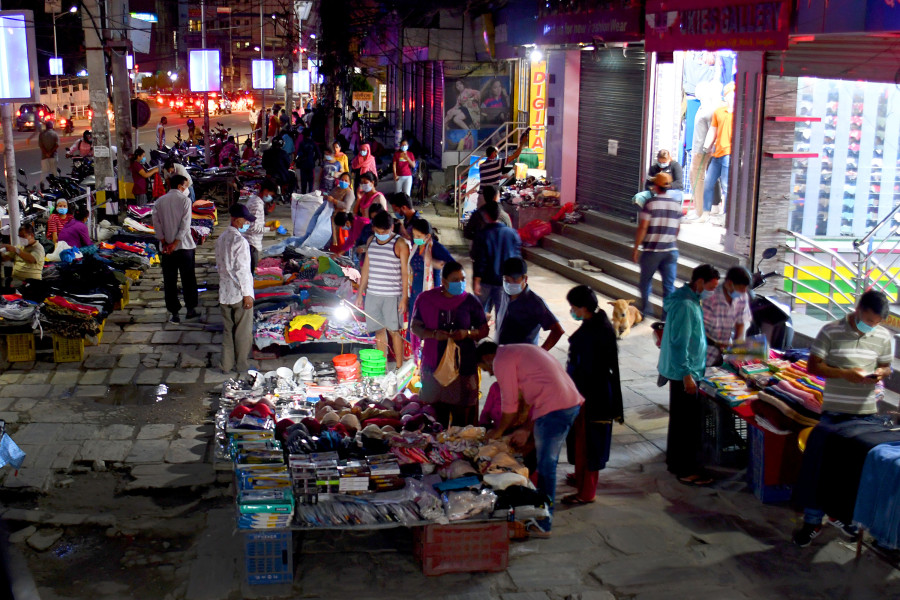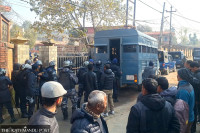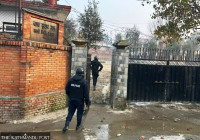Valley
Shops and businesses are not getting customers even during peak festival shopping season
Since Covid-19 has severely decreased the purchasing power of consumers, shops and businesses are struggling to survive.
Anup Ojha
Bijendra Mandal did not open his shop on Wednesday even though it is peak Dashain festival shopping season.
These days the business is just not there, says the 52-year-old who sells bed sheets at Makhan Galli.
After closing his shop for months due to the Covid-19 lockdown and prohibitory orders, Mandal opened his shop only last week. He had hoped with the Dashain festival just a month away there would be a heavy footfall of shoppers. But only a few people are out shopping this year. Many shops are not even getting a single customer throughout the day.
“Not a single customer visited my shop on Tuesday. I opened my shop and waited all day,” said Mandal.
He was in his village in Mahottari during the four-month long coronavirus lockdown. He returned only recently and opened his shop after the three district administration offices of Kathmandu Valley eased the prohibitory orders.
“I returned with the hope of doing some business ahead of the festival. Besides, I also have to collect payments from some retailers who had purchased goods from my shop on credit,” said Mandal.
Since the pandemic and the subsequent lockdown have hit all businesses, Mandal has little hope of recovering the credit. He says he cannot even pay his shop rent if things stayed the same in the coming days.
“I will have to close my shop for good. I cannot continue to pay the shop rent without doing any business. I also need to pay the rent for my flat in Old Baneshwor. On top of that, I also need to clear my own credit for the items I had purchased off some of my regular dealers,” Mandal said.
In festival season during normal times, Mandal used to do transactions worth up to Rs40,000 in a single day. This year has been a bad one for him and all other businesses.
The Covid-19 pandemic has led to a severe economic contraction, job losses and closure of businesses. People’s spending power has decreased and apparently even the festival season has failed to cheer them this time.
Sunil Paudel, who sells kitchenware and home appliances at Chabahil, says his daily business transaction has taken a nosedive since the pandemic.
After closing his shop for months, he too was hoping to earn some money during this festival season. So far, he says the business has been a disappointment.
After his business took an unprecedented dip, Paudel has put two of his staff on unpaid leave.
“I thought the situation would be normal before the festival, but things are getting worse by the day,” said Paudel, who like Mandal had gone to his village in Sindhupalchok during the lockdown that started from March 24.
“I have made a record daily sale of Rs400,000 during one of the festival seasons in the past. This year though it is hard to even do a transaction worth Rs50,000.”
Paudel too has rents to pay, family to look after and loans to pay. The current business climate is not helping him in any way.
Naresh Katwal, president of Nepal National Traders Federation, says while there is no data regarding the loss caused by the pandemic on shops and businesses, the Covid-19 impact on every business area has been profoundly deleterious.
“The purchasing power of consumers has taken a serious blow as many people have lost their jobs due to closure of industries or private companies. In such a situation, businesses are bound to fail,” said Katwal.
Sangita Shrestha, a 44-year-old mother of two, says she has convinced her two children to wear their last year’s clothes.
“I am not going Dashain shopping this year. My husband did not get his salary for four months and we are struggling to pay the rent and buy food. This time we are only focused on buying essential items,” said Shrestha, who lives in Kuleshwor with her husband and their two children.
The fear of coronavirus transmission has also lent to the fact that people are not going out shopping for the festival this year.
According to the Ministry of Health and Population, on Wednesday Kathmandu Valley reached 637 new infections in the past 24 hours. Of them, 492 were confirmed in Kathmandu, 95 in Bhaktapur and 50 in Lalitpur.
As of Wednesday, the number of cases in the Valley has reached 18,574. A total of 16,076 cases were detected after the three district administration offices in Kathmandu Valley imposed prohibitory orders starting August 19 midnight.
If the Covid-19 crisis saw no signs of improvement, there is a risk of more businesses folding in the coming days.
According to Covid-19 Tourism Business Disaster Committee, formed under the Thamel Tourism Development Council, 270 travel and tour agencies, clothes shops, curio shops, restaurants and hotels have closed by July.
There is no data on the closure of shops and businesses in other parts of the Valley. But the figure is estimated to be in hundreds.
“One could see many shops and shop spaces with ‘for sale’ and ‘to let’ notices these days. The pandemic has ruined many shops and businesses,” said Dhananpati Sapkota, chief of the Implementation Division at the Kathmandu Metropolitan City. “Shops are being sold because the people no longer can pay the rent because they are not doing any business.”
Mandal, the bed sheet seller from Makhan Galli, says if everything fails he will have no option than to close his shop.
“Right now, I would be a relieved man if only I could collect the money I owe and pay off my credit. I have been in this business for nearly a decade now and over the years I have learnt that at the end of the day it is loyalty that counts,” he said.




 8.12°C Kathmandu
8.12°C Kathmandu.jpg)











